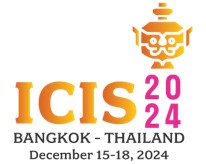Paper Number
1797
Paper Type
Complete
Abstract
Generative AI (GenAI), has taken the world by storm and shown extremely promising effects across different fields, ranging from legal to medicine. Why these systems seemingly are better than existing knowledge management systems and expert AI systems while being more decentralized, is intriguing. To shed light on this novel phenomenon, we study knowledge workers in practice, attempting to understand relational generation and application of knowing with ChatGPT through 12 semistructured interviews with early adopters of the technology. We show how knowledge workers and GenAI i) generate relations and ii) apply relations. The findings outline activities like censoring input to GenAI, composing prompts, checking output, making mistakes, and asking for help as constituent practices of relational knowledge work. Furthermore, we outline how ChatGPT is relational in nature, and suggest implications for practice.
Recommended Citation
Ulfsnes, Rasmus; Mikalsen, Marius; and Barbala, Astri Moksnes, "From generation to application: Exploring knowledge workers’ relations with GenAI" (2024). ICIS 2024 Proceedings. 12.
https://aisel.aisnet.org/icis2024/digtech_fow/digtech_fow/12
From generation to application: Exploring knowledge workers’ relations with GenAI
Generative AI (GenAI), has taken the world by storm and shown extremely promising effects across different fields, ranging from legal to medicine. Why these systems seemingly are better than existing knowledge management systems and expert AI systems while being more decentralized, is intriguing. To shed light on this novel phenomenon, we study knowledge workers in practice, attempting to understand relational generation and application of knowing with ChatGPT through 12 semistructured interviews with early adopters of the technology. We show how knowledge workers and GenAI i) generate relations and ii) apply relations. The findings outline activities like censoring input to GenAI, composing prompts, checking output, making mistakes, and asking for help as constituent practices of relational knowledge work. Furthermore, we outline how ChatGPT is relational in nature, and suggest implications for practice.
When commenting on articles, please be friendly, welcoming, respectful and abide by the AIS eLibrary Discussion Thread Code of Conduct posted here.



Comments
04-Work